
"In the Midnight Hour" is a song originally performed by Wilson Pickett in 1965 and released on his 1965 album of the same name, also appearing on the 1966 album The Exciting Wilson Pickett. The song was composed by Pickett and Steve Cropper at the historic Lorraine Motel in Memphis, later the site of the assassination of Martin Luther King Jr. Pickett's first hit on Atlantic Records, it reached number one on the R&B charts and peaked at number 21 on the pop charts.

"Hush" is a song written by American composer and musician Joe South, for recording artist Billy Joe Royal. The song was later covered by Somebody's Image in 1967. It reached #15. It was also covered by Deep Purple in 1968 and by Kula Shaker in 1997. Each artist had a Top 5 hit with their version.

"Ramblin' Rose" is a 1962 popular torch song written by brothers Noel Sherman (words) and Joe Sherman (music) and popularized by Nat King Cole. The recording by Nat King Cole reached No. 2 on the Billboard Hot 100 chart in 1962.

"Love Is Here and Now You're Gone" is a 1967 song recorded by the Supremes for the Motown label.
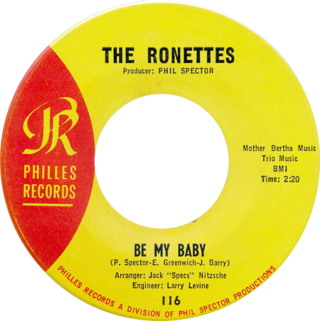
"Be My Baby" is a song by American girl group the Ronettes that was released as a single on Philles Records in August 1963. Written by Jeff Barry, Ellie Greenwich, and Phil Spector, the song was the Ronettes' biggest hit, reaching number 2 in the U.S. and number 4 in the UK. It is often ranked as among the best songs of the 1960s, and it is regarded by some as one of the greatest songs of all time.
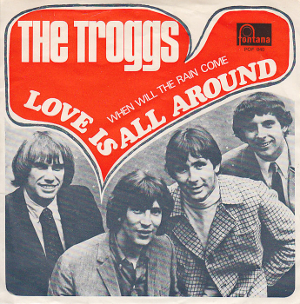
"Love Is All Around" is a song recorded by English rock band the Troggs. Released as a single in October 1967, it was a top-ten hit in both the UK and US.

"Daydream Believer" is a song composed by American songwriter John Stewart shortly before he left The Kingston Trio. It was originally recorded by the Monkees, with Davy Jones singing the lead. The single reached No. 1 on the U.S. Billboard Hot 100 chart in December 1967, remaining there for four weeks, and peaked at No. 5 on the UK Singles Chart. It was the Monkees' third and last No. 1 hit in the U.S.

"Wild Honey" is a song recorded by the American rock band the Beach Boys. Written by Brian Wilson and Mike Love, it was released as the lead single from their 1967 album Wild Honey, with the B-side of the single being "Wind Chimes". The single peaked at number 31 in the U.S. and number 29 in the U.K.
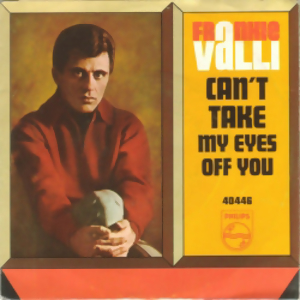
"Can't Take My Eyes Off You" is a 1967 song written by Bob Crewe and Bob Gaudio, and first recorded and released as a single by Gaudio's Four Seasons bandmate Frankie Valli. The song was among his biggest hits, earning a gold record and reaching No. 2 on the Billboard Hot 100 for a week, making it Valli's biggest solo hit until he hit No. 1 in 1975 with "My Eyes Adored You".
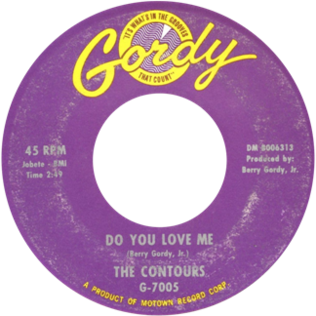
"Do You Love Me" is a rhythm and blues song recorded by the Contours in 1962. Written and produced by Motown Records owner Berry Gordy Jr., it appeared twice on the Billboard Hot 100 chart, reaching numbers three in 1962 and eleven in 1988.

"San Francisco (Be Sure to Wear Flowers in Your Hair)" is an American pop music song, written by John Phillips, and sung by Scott McKenzie. It was produced and released in May 1967 by Phillips and Lou Adler, who used it to promote their Monterey International Pop Music Festival held in June of that year.

"Soul Man" is a 1967 song written and composed by Isaac Hayes and David Porter, first successful as a number 2 hit single by Atlantic Records soul duo Sam & Dave, which consisted of Samuel "Sam" Moore and David "Dave" Prater. In 2019, "Soul Man" was selected for preservation in the National Recording Registry as "culturally, historically, and aesthetically significant" by the Library of Congress. It was No. 463 in "Top 500 Greatest Songs of All Time" by Rolling Stone Magazine in 2010 and No. 458 in 2004.
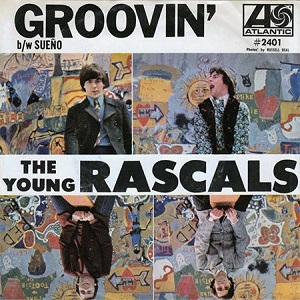
"Groovin'" is a song written by the American singer songwriters Felix Cavaliere and Eddie Brigati, initially recorded by their group the Young Rascals in 1967. Cavaliere was inspired to compose the song by his girlfriend Adrienne Buccheri, whom he only got to meet every Sunday amidst heavy touring and recording. Musically, the song differs from most of band's previous output, leaving the garage rock genre for Latin American influences, such as baião. Lyrically, "Groovin'" tells the tale of a narrator spending time with his partner on a Sunday afternoon. The song was arranged and recorded at the Talentmasters Studios, New York City in March of 1967.

"Don't Pull Your Love" is a song written by Brian Potter and Dennis Lambert which became a top ten hit single in 1971 for Hamilton, Joe Frank & Reynolds.

"Who Loves You" is the title song of a 1975 album by The Four Seasons. It was composed by Bob Gaudio and Judy Parker and produced by Gaudio. It reached number 3 on the Billboard Hot 100 in November 1975.

"C'mon Marianne" is a song composed by L. Russell Brown and Raymond Bloodworth and popularized by The Four Seasons in 1967. Produced by Bob Crewe, the single was the last Four Seasons single to reach the Top Ten of the Billboard Hot 100 chart in the 1960s, and their last Top Ten hit until "Who Loves You" in 1975.
"New Mexican Rose" is a song by the American rock band The Four Seasons. The song was composed by producer Bob Crewe and arranger Charles Calello. While sales did not match that of the singles' predecessors, "New Mexican Rose" did make it into the Top 40 of Billboard's Hot 100 singles chart, reaching a peak position of #36 in November 1963.
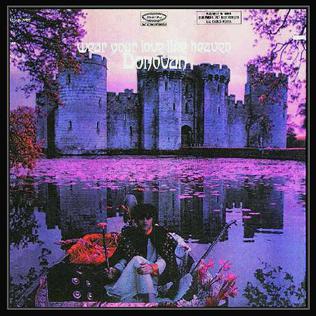
"Wear Your Love Like Heaven" is a song and US single by British singer-songwriter Donovan, released in 1967. It became the opening track of his 1967 double-disc album A Gift from a Flower to a Garden. It peaked at No. 23 in the Billboard Hot 100.

"Just One Look" is a song co-written by American R&B singers Doris Troy and Gregory Carroll. The recording by Doris Troy was a hit in 1963. The Hollies, Anne Murray, Linda Ronstadt and Iain Matthews each achieved great success with the song. There have also been many other versions.

"Until It's Time for You to Go" is a song from the 1965 album Many a Mile by American singer-songwriter Buffy Sainte-Marie. Sainte-Marie included a French-language reworking of the song, "T'es pas un autre", on her 1967 album Fire & Fleet & Candlelight. French translation was made by Quebecer songwriter Claude Gauthier.



















